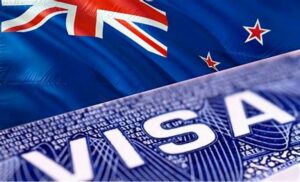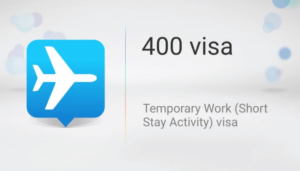A brief overview of the Subclass 400 Temporary Work (Short Stay Specialist) visa
The Subclass 400 Temporary Work (Short Stay Specialist) visa (‘the specialist visa’) is a type of visa issued by the Australian government that allows individuals to come to Australia for a short period of time to perform a specific type of work.
There are two streams for this visa.
- For the highly specialised work stream, it is designed for those who are highly skilled and specialised in their field, and who have been offered a short-term job in Australia.
- In terms of Australia’s Interest stream, you must demonstrate that there are compelling circumstances affecting Australia’s interests and the applicant is allowed to and stay in Australia for those compelling circumstances.
To be eligible for the highly specialised work stream of this visa, you must have a valid job offer from an Australian employer for a position that cannot be filled by an Australian citizen or permanent resident. You must also have the skills, qualifications, and experience necessary to perform the work, and you must be able to demonstrate that you are a genuine visitor who will leave Australia at the end of your stay.
The length of stay on this visa can range from three months to six months, depending on the nature of the work and the conditions of the visa. You must also comply with the conditions of the visa, including the requirement to maintain health insurance while in Australia and to only engage in the work specified in your visa application.
One of the benefits of applying for this visa is the short processing time. In general, the specialist visa processing time is much shorter than other work visa subclasses, such as the Subclass 482 and Subclass 494 visa.
Overall, the specialist visa provides a flexible and fast option for individuals who need to come to Australia for a short period of time to perform specialised work urgently.
The eligibility criteria for the Subclass 400 Temporary Work (Short Stay Specialist) visa are:
- Job offer: The applicant must have a job offer for highly skilled work in their field of expertise, and the employer must be an approved sponsor.
- Compelling Circumstances: where the application is seeking the visa grant under the compelling circumstances stream, they must demonstrate the existence of compelling circumstances which affect Australia.
- Specialisation: The position must be highly skilled, and the skills required for the position must not be available in the Australian labour market.
- Financial requirements: The applicant must have adequate means to support themselves or have access to adequate means to support themselves during their intended stay in Australia.
- Health and character requirements: The applicant must meet the health and character requirements as specified by the Department of Home Affairs.
- English language ability: While there is no formal English language requirement for this visa, the applicant must have sufficient English language ability to undertake the work for which they have been offered a job.
These are the general eligibility criteria for the specialist visa. It is always a good idea to check the most recent information and guidelines from our professional migration legal team. We are keen to assist your visa application to suit your specific circumstances and needs.

Highly Skilled and Specialized Stream
The meaning of highly skilled and specialised in their field.
When an individual is considered “highly skilled and specialised in their field,” it means that they have a high level of expertise, knowledge, and experience in a specific area of work. This level of expertise is usually obtained through years of education, training, and practical experience.
For the specialist visa, being highly skilled and specialised in one’s field means that the individual is recognized as an expert in their field and is in high demand for their specialised skills and knowledge. This is usually demonstrated through factors such as advanced degrees, certifications, and a proven track record of successful work in the field.
The Australian government considers a person to be highly skilled if they have the skills, qualifications, and experience necessary to perform the work specified in their visa application, and if they are able to demonstrate that they are a genuine temporary entrant who will leave Australia at the end of their stay.
In general, being highly skilled and specialised in one’s field is a critical factor in being eligible for a specialist visa and is considered by the government when determining whether to grant a visa.
Examples of Highly Skilled and Specialised Fields
The eligible role is required to be highly skilled and specialised. However, it does not require the role to be technical. It is a common mistake that the Subclass 400 Temporary Work (Short Stay Specialist) visa is only designed for occupations such as engineering roles or tradesmanship. Non-technical roles can be eligible for the specialist visa, if they satisfy the ‘highly skilled and specialised’ criterion. The following are some examples of jobs that satisfy the ‘highly skilled and specialised’ requirements.
- an installer or maintainer of recently imported equipment, which requires specific knowledge to install or maintain.
- a skilled mining engineer advising on a particular procedure or product which is not in use in Australia.
- a training professional seeking to enter Australia to support the introduction of new products (for example, newly developed software), concepts or methods (for example, innovative business management techniques) to the Australian workplace or the opening of an international business in Australia.
- an internal auditor of an international company who may be required to audit an Australian subsidiary against company-specific control standards.
Whether an applicant satisfies the highly skilled and specialised field requirement will largely depend on the individual circumstances, such as qualifications, licences, registrations, work experiences, nature of the work and many other relevant issues. Please contact our professional migration team to discuss your circumstances before lodging this type of visa.
Jobs that might not satisfy the Highly Skilled and Specialised Requirements
Please note that the Subclass 400 Temporary Work (Short Stay Specialist) visa is not intended for workers who wish to work in a generic profession. For example:
- a team of tradespersons being brought to Australia to perform annual shutdown maintenance in an Australian factory.
- a computer programmer being brought to Australia to assist a company to manage tight deadlines or peak workloads or
- an electrician being brought to Australia to install electrical wiring in a new housing development.

Australia’s Interest stream
Australia’s interest stream enables the Department to grant the specialist visa if there are ‘compelling circumstances affecting Australia’s interest’ to applicants who do not satisfy the highly skilled and specialised stream requirement.
Compelling circumstances in the migration policy
In general, compelling circumstances means unusual or special circumstances in its nature. This stream provides the Department a general discretion to grant the specialist visa based on the individual circumstances.
For example:
- the entry of the a person is required to assist in a disaster or emergency or
- Australia’s relationship with a foreign government would be damaged were the person not granted the visa or
- Australia would miss out on a significant benefit that the person could contribute to Australia’s business, economic, cultural or other development (for example, a special skill that is highly sought after in Australia) if the person was not granted the visa or
- Australia’s trade or business opportunities would be adversely affected were the person not granted the visa.
Please note that the visa grant under this stream is discretional and highly circumstantial. Please contact our professional migration team to discuss your circumstances before lodging your specialist visa application.
Other Criteria which apply to both streams
Demonstrated need to be in Australia.
The specialist visa is designed to allow visa holders to visit Australia to participate in certain events or work. The visa applicant must demonstrate that there is a genuine need for the applicant to visit in person to present in Australia in person to fulfil their obligations.
The Department may have regard to, but are not limited to considering, the following factors:
- the applicant’s current occupation and skill level (i.e. training and experience), the applicant’s field of study (whether current or recently completed) or area of expertise
- whether the applicant’s proficiency in English is sufficient to undertake the proposed activity or work and
- the number of times the applicant has undertaken the same or similar activity or work.
Like the highly skilled and specialised requirement, this requirement is also dependent on many factors of your circumstances. Please contact our professional migration team to discuss your circumstances before lodging this type of visa.
Genuine Temporary Entry
The specialist visa applicant must demonstrate that they genuinely intend to stay temporarily in Australia for the purpose for which the visa is granted. The department might consider the following factors:
- whether the applicant has complied substantially with the conditions to which the last substantive visa, or any subsequent bridging visa, held by the applicant was subject; and
- whether the applicant intends to comply with the conditions to which the Subclass 400 visa would be subject; and
- any other relevant matter.
Genuine temporary entry requirement is another important issue for this type of visa application. Please contact our professional migration team to discuss your circumstances before lodging this type of visa.
Adequate means of support
Even though most of the specialist visa applicants will engage in paid work activities in Australia, the specialist visa still requires the applicants to prove that they have adequate financial capacity to support themselves during their stay in Australia.
Concluding remarks
The specialist visa is suitable for visa applicants who wish to work in Australia in highly skilled fields on a non-ongoing basis. It also allows applicants to help Australia in the event of natural disaster or other compelling circumstances. The short processing time is also one of the many benefits that this type of visa can help.
However, it cannot be used for ongoing work or training purposes, where other types of work visas may be more appropriate. Therefore, applicants and their Australian employer must be wary about the purpose and nature of this type of visa before applying. At Legal Point Lawyers, we have a professional migration law team who has years of experience in helping our clients to achieve their goals. Please contact our professional team for the customised assistance regarding specialist visa or any other types of visas.
 Mr Tianhao Wu has a very strong background in Australia immigration law, especially in visa applications and AAT appeal applications. He is very experienced in all types of visa applications such as Global Talent Immigration, student visas, tourist visas, parent visas, partner visas, employer sponsored visas, general skilled visas, business skilled visas, bridging visas, other temporary visas, and AAT appeal applications.
Mr Tianhao Wu has a very strong background in Australia immigration law, especially in visa applications and AAT appeal applications. He is very experienced in all types of visa applications such as Global Talent Immigration, student visas, tourist visas, parent visas, partner visas, employer sponsored visas, general skilled visas, business skilled visas, bridging visas, other temporary visas, and AAT appeal applications.
Please contact Mr Tianhao Wu:
Email: tianhao.wu@legalpointlawyers.com.au
Mobile: 0416 316 188
